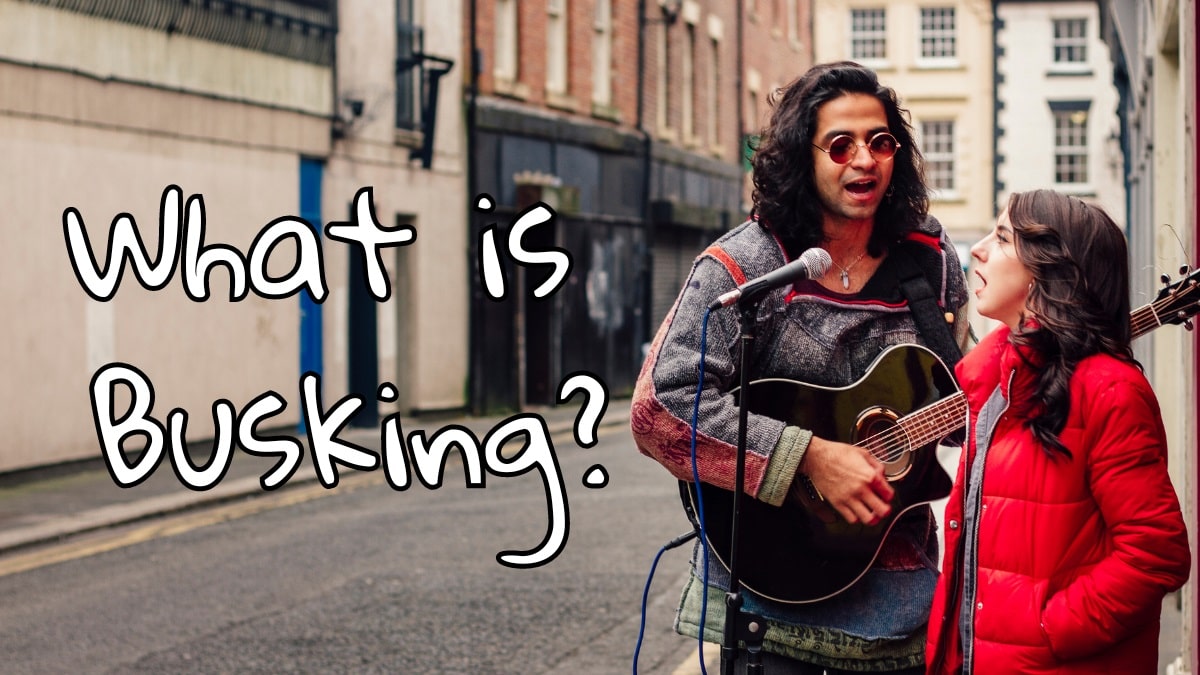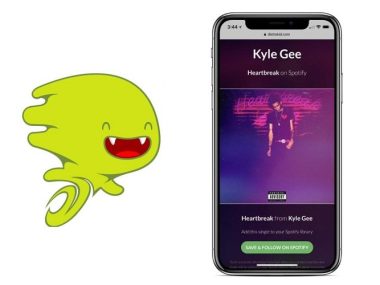As a musician who’s busked for the experience, it always brings me unbridled joy when I come across a busker who clearly enjoys what they do.
They’re actively creating their own lifestyle and presenting their art in technicolor—what’s there not to like?
Although not as popular now as it was back in the Middle ages, busking has been around as long as there have been streets.
But this begs the question: what is busking, really?
What does it entail?
Can you even make a living out of it?
In this article, I’ll discuss everything you need to know about the centuries-old tradition of busking.
I’ve also included some handy tips for first-time buskers, based on real-life experience.
Let’s dive right in!
What Is Busking?
Busking is the act of performing in public places, either through dancing, singing, or playing a musical instrument, in exchange for voluntary donations or gratitudes.
It’s also known as street performance.
Short and Sweet History of Busking
Busking is a centuries-old tradition that dates back to ancient times. It’s been around since public spaces were invented.
Back in the olden days, busking was one of the easiest ways to earn money. In fact, busking was so popular that it became a bit of a “street music problem.”
Even British author Charles Dickens was “wearied and driven nearly mad” by these street musicians.
Troubadours, comedians, magicians, bards, wandering minstrels, and showmen in street fairs would perform in streets and plazas, as well as bars and restaurants, to earn a living.
Merchants and local store owners would invite these performers to their storefronts to attract new business, or simply entertain their guests.
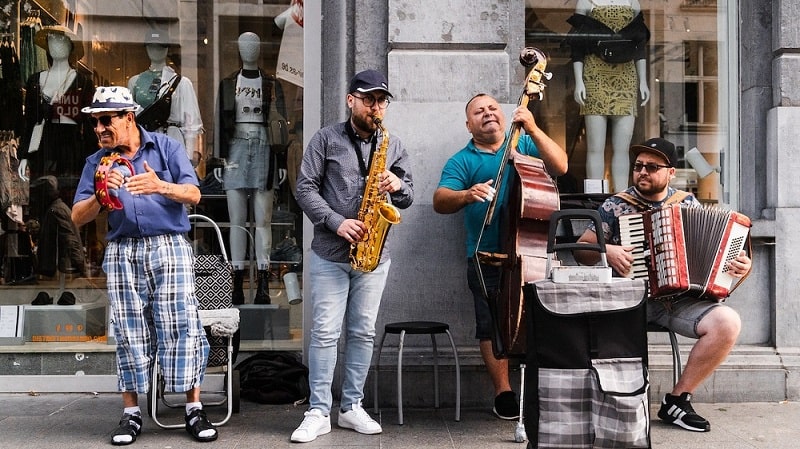
Fast forward several decades, and busking is here to stay.
It’s certainly not as popular today as it was back then, but pedestrians are still treated to live music and performances in many cities across the globe.
Modern buskers are dubbed traveling musicians, street-corner performers, or troubadours.
They come in many forms; some are dancers, some are mimes, and some are artists or musicians with years of experience.
They can be balloonists, rope walkers, contortionists, puppeteers, fortune tellers, and much, much more.
There’s no limit to a busker’s profession; as long as the act can be performed outside, it’s fair game.
With the open world as their stage, buskers entertain thousands of people daily.
But unfortunately, street performances are at risk of being licensed out of existence with today’s strict approach to public expression.
With permit systems, fees, equipment bans, auditions, and written application processes, it’s becoming more and more difficult for buskers to do what they love without the restriction of the law.
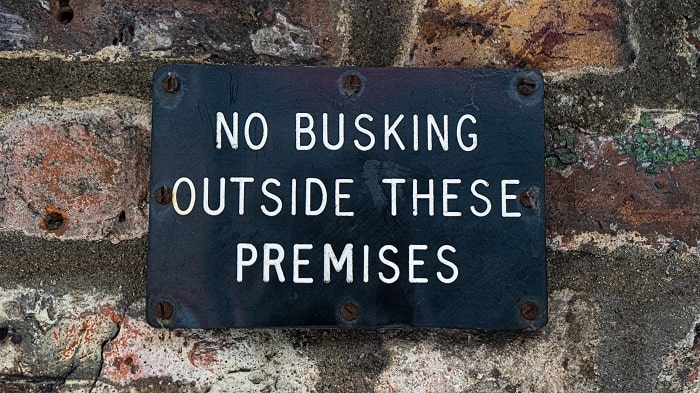
That’s not even the worst of it. Buskers are constantly harassed, fined, and arrested, further discouraging artists from performing in public.
The negative stereotypes associated with busking aren’t helping, either.
Still, people continue to make a living busking. Nothing could completely dampen the lively human spirit, and busking is its single most common expression.
Is Busking Illegal in the US?
In the US, busking falls under artist free speech and is thus protected by the First and Fourteenth constitutional amendments.
Even when localities tried to pass laws for busking permits and other requirements, the U.S. Supreme Court has consistently brushed them off as “unconstitutional.”
Authorities can’t prohibit a busker from performing in public land where other forms of free speech aren’t prohibited.
The only exceptions to the free speech rule are sedition (disturbance against lawful civil authority), obscenity, criminal behavior such as defamation or fraud, and public displays of pornography.
Other reasons to prohibit the act of busking include noise issues in certain public areas like residential, hospital, and retirement zones, as well as public safety issues.
In some areas, busking is not only tolerated but encouraged.
When properly regulated, its advantages to the community far outweigh the disadvantages.
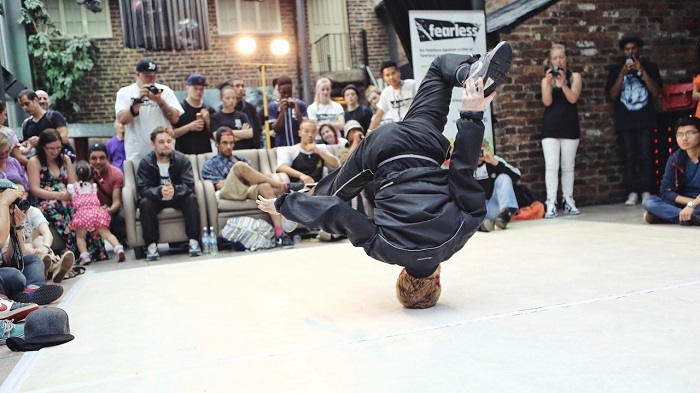
They’re a great benefit to business owners who want to increase traffic, plus they bring life to urban environments and encourage social tolerance.
That said, major cities do have some busking laws in place that buskers must follow.
Chicago, for instance, l need buskers to hold a special busking permit for every performance. Some areas also have set times in place for when buskers can perform.
Boston takes it a step further by issuing a background check and audition before allowing buskers to perform for the public.
New York is arguably the busker-safe city in the US; buskers can perform anywhere except from within 50 feet of monuments.
What About In Other Countries?
Busking isn’t illegal in most parts of the world, but some countries do have some busking laws in place depending on the city.
In large Canadian cities, like Vancouver and Montreal, buskers need to have a busking permit to perform in the streets.
Otherwise, the busker might face financial penalties.
Smaller cities like Stanford, Ontario don’t need such permits, but buskers are obligated to respect the community rules and keep the noise level tolerable.
Busking isn’t illegal in the UK, but rules vary depending on the local community and region.
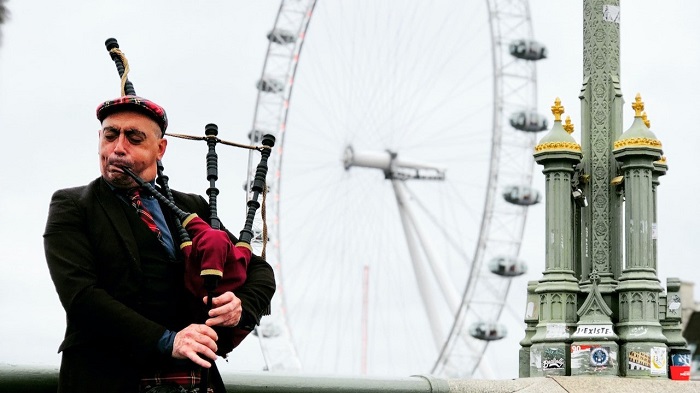
Some require a busking license, while others don’t. Busking fees start from £20 a month, but some councils request no payment at all.
Countries like Germany, Belgium, Austria, and France require performers to hold a busking permit, especially when performing in large cities and bigger towns.
The same is said in Italy, with the North being less strict than the South, with police patrolling areas such as Amalfi Coast where busking is completely banned.
What Are the Advantages of Busking?
Busking might be your one-way ticket to success if you’re a musician or a performer looking to boost your career.
Here are some of the many advantages of busking:
Boosts Public Reputation
If you’re a well-known busker in your community, you’ll gain a bit of a public following.
People will start looking forward to your shows and may even request commissioned performances.
You’ll also increase your chances of being hired for a private show at weddings, parties, and events.
After all, gigs are much easier to obtain when people have heard and seen you perform firsthand!
Self-Promotion
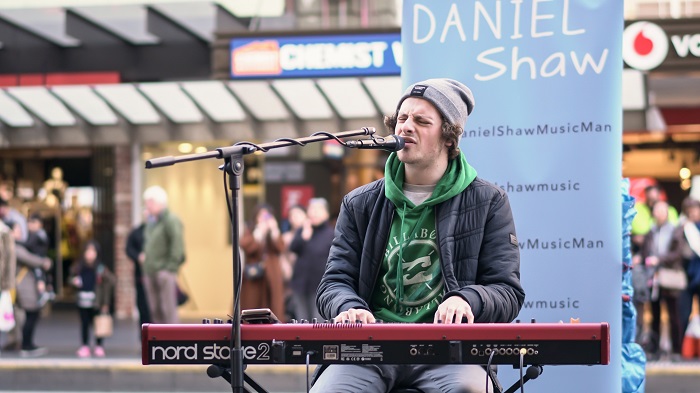
Busking is basically free publicity; it allows you to reach audiences who have otherwise never heard about you.
If you do it right, you can gain a whole legion of fans busking. Your work will be noticed and your name will be uttered with recognition.
To make your presence even more known, you can get a friend or family members to come along and record your performance, which you can then post online.
You can also set up a camera and stream your work on Twitch live to boost your online popularity.
Fans may likewise post videos or photos of your performances on their own platform.
And if you’re lucky, these posts might go viral and get recognized by big brand companies.
When done right, street popularity can definitely translate into online growth and distinction.
Just take a look at Ed Sheeran, Michael Rosenburg (Passenger), and Tracy Chapman.
They all started off as buskers but got recognized for their talents through their street performances.
Earns You Decent Money
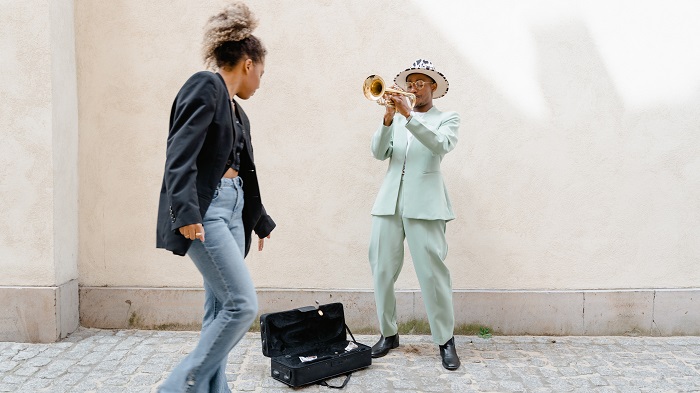
Earning money is one of the many benefits of busking.
According to reports, buskers earn anywhere between $60,000 to $90,000 a year, depending on the location and talent.
This figure might be a bit exaggerated, but you can certainly bring in an average of $50 a day during weekdays.
This figure increases from between $100 and $150 a day over weekends as long as you pick a time and location.
You can even make up to $500 in a single weekend if you play your cards right.
For many people, busking is a full-time job. They’d perform six to eight hours a day, every day.
For others, it’s a way to get extra income to boost their music careers.
With the money saved, they can use it to purchase a new studio kit or book valuable studio time to record their shows.
You can do the same; either treat it as a freelance job or as a way to earn extra cash to further your artistic career.
Builds Confidence
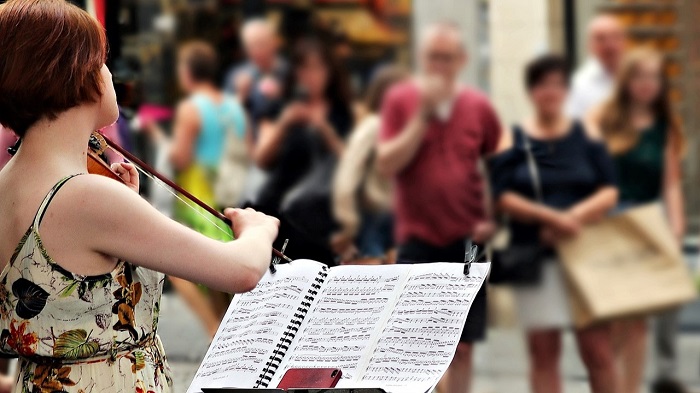
Nothing’s more intimidating than performing in front of a huge crowd, with dozens of eyes watching (and silently judging) your every move.
Busking allows you to work on your confidence and improve on any areas that need improving.
It also teaches you to think on your feet and read the crowd.
Plus, it gives you the opportunity to try out any original songs or material you’ve come up with!
All in all, busking lets you develop as an artist.
With the feedback you’ll no doubt receive from the public, you can hone your skills into bettering yourself more performance-wise.
Connect With Like-Minded People
Busking allows you to connect and meet like-minded people who may be able to share some of their tips, wisdom, and experiences with you.
You can also make a ton of musician friends that you can collaborate with in future projects.
They may even recommend you to their previous employers, scoring you a gig at weddings, festivals, events, and the like.
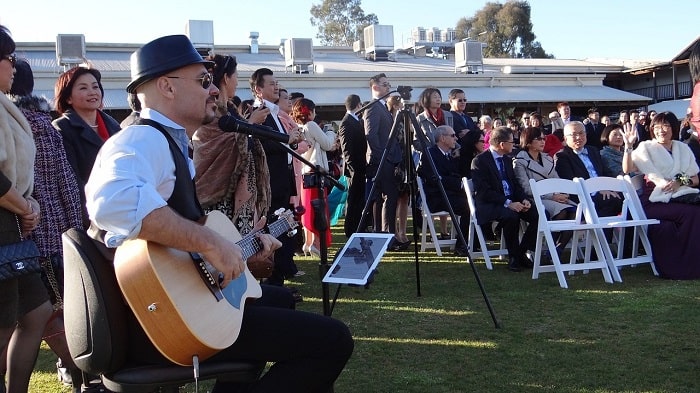
You’re Your Own Boss
Another great benefit of busking is that you’re your own boss.
Aside from the rules you need to abide by, no one can tell you what to play and when to take a break.
You don’t have to spend time searching the internet for gigs and hoping one of the dozens of establishments you’ve emailed sends you a response.
You do it when you want to, without a schedule to adhere to.
Furthermore, you get to meet lots of people from all over the world and get paid to travel and have fun. It’s the most democratic form of entertainment.
I had a friend who would turn down $500 gigs to play on the street.
This reasoning was simple: he didn’t like being told when, where, and what to play by event planners.
In his mind, money was secondary; he was a performer above all else, and he shone brightest around a crowd of people in the open air, doing what he loves without restriction.
Brings Joy to the Local Community
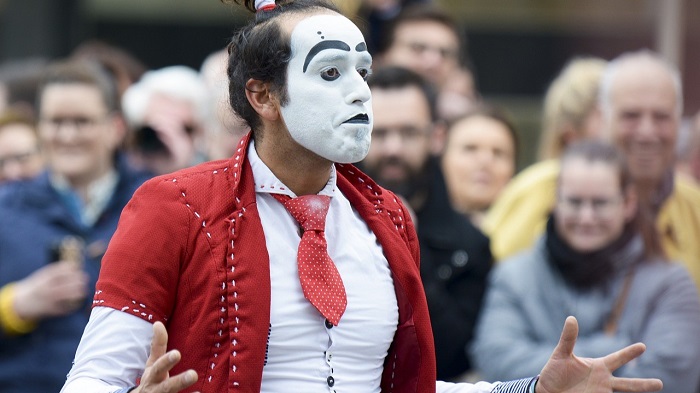
Buskers have the innate ability to touch the hearts and minds of both young and old.
They enhance people’s perspective of the world, staining it with bright neon colors—a reprive of the otherwise black-and-white monotone of daily life.
They encourage free expression, provide circumstances of cross-cultural exchange, and bring life to commercialist urban environments.
I can’t count the times I’ve stopped to watch a busker perform on my way to work.
I’d come in 10 minutes late without any regrets, because seeing an artist perform what they love always brightens up the rest of my day.
I imagine it’s the same for a lot of people.
Plus, it’s always nice to see the look of absolute wonder on children’s faces when they come across a street performer. Their curiosity is infectious.
I also love watching young and old laugh, smile, and dance around as a performer plays a particularly jaunty melody.
It feels like an escape from the humdrum of daily life.
So if you’re an artist who loves making people smile and dance above all else, busking is a good opportunity to add charm to the place around you.
You’ll not only provide people with the chance to experience your music but also connect to you on a more “spiritual” level.
Gives You Plenty of Exercise
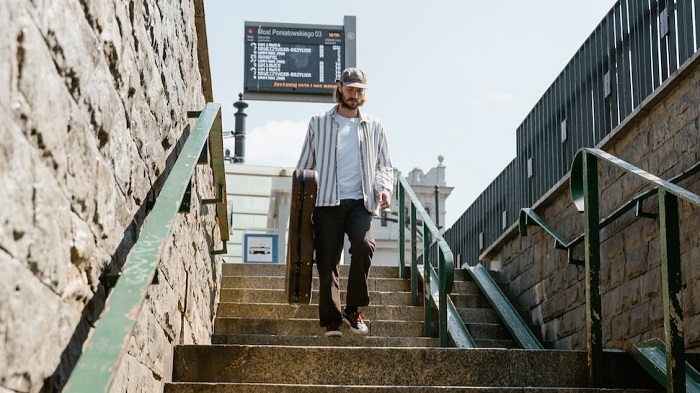
Although not as impactful as the rest of the benefits on this list, it’s still worth mentioning: busking gives you plenty of exercise.
More often than not, you’ll end up walking quite a bit around town just to find the “perfect” busking spot, equipment in hand.
Some days, you’ll end up walking up and down the street throughout the day.
You’ll also exert some energy during your performance to entertain the crowd, like dancing while playing an instrument.
6 Helpful Tips and Tricks for Beginner Buskers
Busking is a gratifying way to play music and interact with people from all walks of life while making money on the side.
It can be the perfect side-hustle if you’ve got several hours of your day to spend performing for people.
Here are some of the best beginner tips I’ve learned when I started busking on my own:
Pick Your Spot Wisely
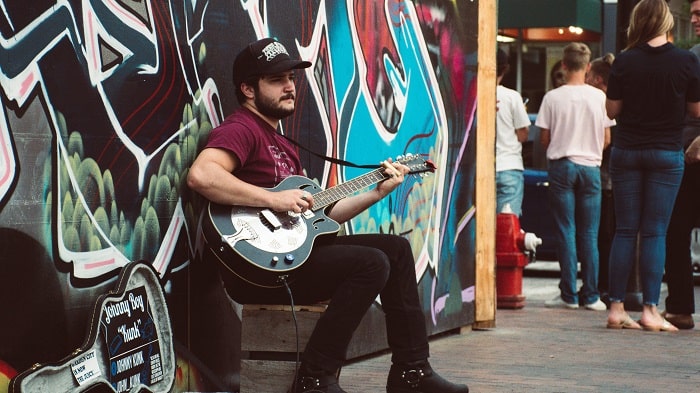
You can’t make a lot of money if you’re located in some remote corner of the world.
You want to busk in a well-trafficked area to encourage a crowd while simultaneously keeping you safe.
There are a lot of places to busk in, from public squares to subway stations.
Choose an area with plenty of space and light so even when a crowd gathers, you won’t be dismissed for making a disturbance or blocking the street.
Mind the space you’re occupying. Stay clear of stairs, escalators, and doorways, as well as the middle of sidewalks and pathways.
Also, play behind an eye-catching structure, like a fountain or a wall with creative graffiti.
This not only makes for a good background if someone decides to take a video but also guarantees your safety.
You certainly don’t want people sneaking up behind you and catching you off guard.
Here are some location ideas:
- Outside or adjacent to theaters or cinemas
- Public parks or gardens
- Train stations
- Festivals
- Privately managed shopping arcade (with permission from the owner)
- Privately owned laneways and streets (with permission from the owner)
- Shopping thoroughfares
Acknowledge Your Supporters

Be courteous to your viewers!
No matter the amount, always be courteous to your benefactors. This will encourage other people to add more money to the pile.
If someone puts $30 in your case, smile and say thank you. If someone puts a penny in your case, thank them all the same.
In the same vein, don’t openly ask for money.
Don’t be upset when people don’t give you money after watching your performance, either.
You can certainly sell merch or even CDs, but don’t charge people for your performances.
You chose a public place out of your own free will; people will pay you or they won’t. And most of the time, they won’t. Such is the life of a busker.
Don’t ruin the atmosphere by glaring or frowning at people who don’t pay you.
Get a Busking License or Permit
Since busking falls under free speech in the US, authorities can’t prohibit you from performing in a public place where other forms of speech aren’t regulated.
But just to be safe, get yourself a busking license or a permit before performing in a public space.
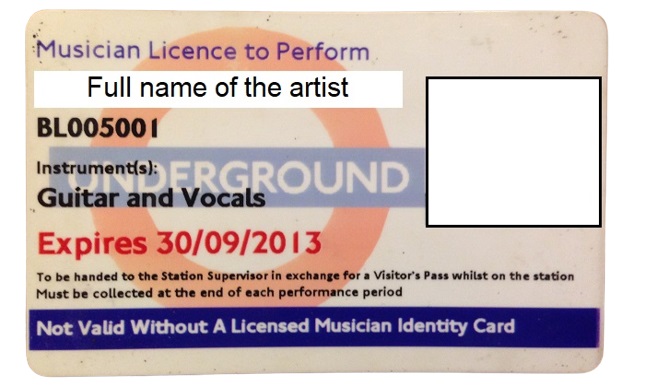
Every location has its own busking guidelines and regulations that you must follow no matter what, lest you be fined or kicked out.
If the city or town you’re performing in has a website, start your research there. If it doesn’t, personally inquire with the local office or the city hall.
A standard busking ID is either low-cost or free. It can be a monthly license, a six-month license, or a yearly license.
Some cities, like Boston, require a background check before issuing a busking permit.
It can be immensely time-consuming, but if it’s what’s required in your area, you’ve got to do it. Again, it’s better safe than sorry.
Be Respectful to Other Buskers
Use some common courtesy and don’t set up in an area where you’ll be in direct competition with another busker.
Don’t hog the best spots in town, either. As a rule of thumb, don’t spend more than four hours in a single location.
Move around and position yourself in a different part of the city every now and again.
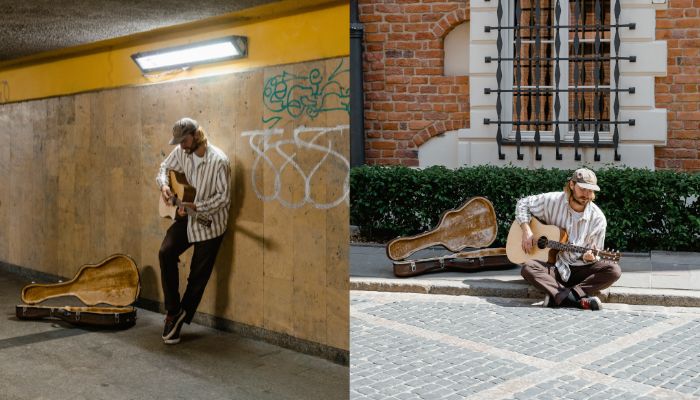
Support your fellow buskers but don’t let the veterans intimidate you.
No one “owns” a spot; there’s absolutely no reason you can’t perform in the same spot another time.
It’s also good to make connections with other buskers, so always be polite when approaching them.
If they’re working, throw some money in their case as a gesture of goodwill and compliment their work.
Then, ask whatever you’d like to know without dilly-dallying. The longer you talk to them, the more they lose performance money.
If they don’t want to talk, that’s completely fine; they’re working, after all, and some people don’t want to be disturbed while working.
Keep It PG
Keep your performance safe and family-friendly. Don’t cuss or do dangerous acts like swallowing swords or breathing fire.
Remember: the people who are most attracted to your performances are little children.
Children are naturally curious, so they’ll likely stop by to watch your performance.
If you can perform in front of your own child or the youngest member of your family without repercussions, then you’re good to go.
Smile and Have Fun
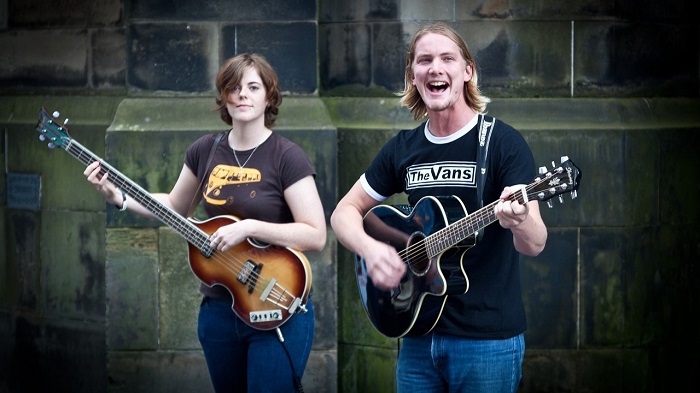
If you want to make it as a street performer, you need to be entertaining.
Have a good time while performing; it just won’t do if you look like you’d rather be anywhere but there.
Remember: energy is infectious.
You’re projecting whatever you’re thinking and feeling to others through your work.
These performances aren’t just about you; it’s also about everyone around you. If you’re negative, you’ll impact others in a negative way.
That’s something you don’t want the crowd to feel. You want them to feel entertained and happy.
And if you’re not having fun or don’t really have any clue what you’re doing, then fake it till you make it.
People can’t read minds. And even if they do, they won’t take the time out of their lives to read the mind of a random street performer.
So plaster on a bright smile, puff out your chest, and perform like you have all the confidence in the world.
Eventually, you’ll feel good too. A little confidence goes a long way.
The exhilaration of a performance injects dopamine into the brain, making you feel happier and less stressed.
So use that smile of yours when performing—there’s literally no harm in it!
